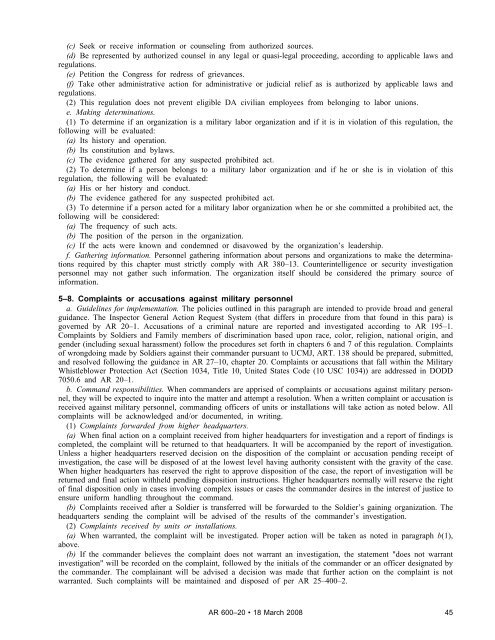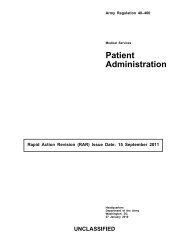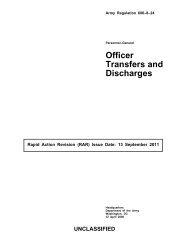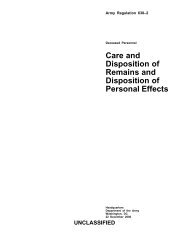AR 600-20, Army Command Policy - Army Publishing Directorate ...
AR 600-20, Army Command Policy - Army Publishing Directorate ...
AR 600-20, Army Command Policy - Army Publishing Directorate ...
You also want an ePaper? Increase the reach of your titles
YUMPU automatically turns print PDFs into web optimized ePapers that Google loves.
(c) Seek or receive information or counseling from authorized sources.<br />
(d) Be represented by authorized counsel in any legal or quasi-legal proceeding, according to applicable laws and<br />
regulations.<br />
(e) Petition the Congress for redress of grievances.<br />
(f) Take other administrative action for administrative or judicial relief as is authorized by applicable laws and<br />
regulations.<br />
(2) This regulation does not prevent eligible DA civilian employees from belonging to labor unions.<br />
e. Making determinations.<br />
(1) To determine if an organization is a military labor organization and if it is in violation of this regulation, the<br />
following will be evaluated:<br />
(a) Its history and operation.<br />
(b) Its constitution and bylaws.<br />
(c) The evidence gathered for any suspected prohibited act.<br />
(2) To determine if a person belongs to a military labor organization and if he or she is in violation of this<br />
regulation, the following will be evaluated:<br />
(a) His or her history and conduct.<br />
(b) The evidence gathered for any suspected prohibited act.<br />
(3) To determine if a person acted for a military labor organization when he or she committed a prohibited act, the<br />
following will be considered:<br />
(a) The frequency of such acts.<br />
(b) The position of the person in the organization.<br />
(c) If the acts were known and condemned or disavowed by the organization’s leadership.<br />
f. Gathering information. Personnel gathering information about persons and organizations to make the determinations<br />
required by this chapter must strictly comply with <strong>AR</strong> 380–13. Counterintelligence or security investigation<br />
personnel may not gather such information. The organization itself should be considered the primary source of<br />
information.<br />
5–8. Complaints or accusations against military personnel<br />
a. Guidelines for implementation. The policies outlined in this paragraph are intended to provide broad and general<br />
guidance. The Inspector General Action Request System (that differs in procedure from that found in this para) is<br />
governed by <strong>AR</strong> <strong>20</strong>–1. Accusations of a criminal nature are reported and investigated according to <strong>AR</strong> 195–1.<br />
Complaints by Soldiers and Family members of discrimination based upon race, color, religion, national origin, and<br />
gender (including sexual harassment) follow the procedures set forth in chapters 6 and 7 of this regulation. Complaints<br />
of wrongdoing made by Soldiers against their commander pursuant to UCMJ, <strong>AR</strong>T. 138 should be prepared, submitted,<br />
and resolved following the guidance in <strong>AR</strong> 27–10, chapter <strong>20</strong>. Complaints or accusations that fall within the Military<br />
Whistleblower Protection Act (Section 1034, Title 10, United States Code (10 USC 1034)) are addressed in DODD<br />
7050.6 and <strong>AR</strong> <strong>20</strong>–1.<br />
b. <strong>Command</strong> responsibilities. When commanders are apprised of complaints or accusations against military personnel,<br />
they will be expected to inquire into the matter and attempt a resolution. When a written complaint or accusation is<br />
received against military personnel, commanding officers of units or installations will take action as noted below. All<br />
complaints will be acknowledged and/or documented, in writing.<br />
(1) Complaints forwarded from higher headquarters.<br />
(a) When final action on a complaint received from higher headquarters for investigation and a report of findings is<br />
completed, the complaint will be returned to that headquarters. It will be accompanied by the report of investigation.<br />
Unless a higher headquarters reserved decision on the disposition of the complaint or accusation pending receipt of<br />
investigation, the case will be disposed of at the lowest level having authority consistent with the gravity of the case.<br />
When higher headquarters has reserved the right to approve disposition of the case, the report of investigation will be<br />
returned and final action withheld pending disposition instructions. Higher headquarters normally will reserve the right<br />
of final disposition only in cases involving complex issues or cases the commander desires in the interest of justice to<br />
ensure uniform handling throughout the command.<br />
(b) Complaints received after a Soldier is transferred will be forwarded to the Soldier’s gaining organization. The<br />
headquarters sending the complaint will be advised of the results of the commander’s investigation.<br />
(2) Complaints received by units or installations.<br />
(a) When warranted, the complaint will be investigated. Proper action will be taken as noted in paragraph b(1),<br />
above.<br />
(b) If the commander believes the complaint does not warrant an investigation, the statement "does not warrant<br />
investigation" will be recorded on the complaint, followed by the initials of the commander or an officer designated by<br />
the commander. The complainant will be advised a decision was made that further action on the complaint is not<br />
warranted. Such complaints will be maintained and disposed of per <strong>AR</strong> 25–400–2.<br />
<strong>AR</strong> <strong>600</strong>–<strong>20</strong> 18 March <strong>20</strong>08<br />
45
















